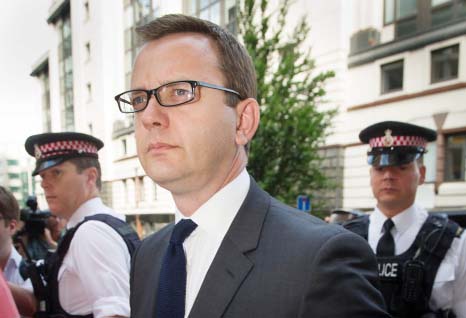
BBC Online :
Former News of the World editor Andy Coulson has been jailed for 18 months for conspiracy to hack phones.
The 46-year-old, who went on to become director of communications for Prime Minister David Cameron, was found guilty at the Old Bailey last week.
He was one of four ex-journalists at the tabloid to be sentenced, along with private investigator Glenn Mulcaire.
Five defendants, including former News International chief Rebekah Brooks, were cleared of all charges last week.
Weatherup and Mulcaire also received 200 hours of community service.
Asked about the jailing of his former communications chief, the prime minister, who has apologised for hiring him, said: “What it says is that it’s right that justice should be done and that no one is above the law – as I’ve always said.”
Coulson, of Charing in Kent, had denied the charges against him but was found guilty of plotting to intercept voicemails between 2000 and 2006.
His lawyer had argued his client did not know the hacking going on while he was editor was illegal.
The presence of the security guards, three of them, was the first sign that Andy Coulson’s freedom was about to be curtailed.
The guards sat in the glass-panelled dock with the defendants, while in front of them were rows of bewigged barristers.
Coulson was next to Mulcaire. The man who hacked for him. The man who the former editor, on oath, insisted he’d not known about until the private investigator’s first arrest in 2006. Both stared straight ahead.
And then the judge, Justice Saunders, arrived to deliver the latest chapter in the downfall of Andrew Edward Coulson.
The spin doctor, who once advised a British prime minister on image and presentation, displayed no reaction when sentence was passed, other than to swallow hard and glance at the public gallery.
The tabloid editor who hacked, and who escaped justice once to work in Downing Street, has got his comeuppance.
Sentencing the five men, the judge, Justice Saunders, said it was not his role to pass judgement on the relationship between the police, press and the government. This had been the job of the Leveson Inquiry, he said.
What was relevant, he said, was the amount of hacking and the period over which it occurred.
Hacking had picked up “intensely personal” messages, the judge said, causing “serious distress to the subjects”.
He referred to the hacking of murdered schoolgirl Milly Dowler’s phone, saying the News of the World’s delay in telling police about voicemails had been “unforgiveable”.
The judge said he was in no doubt Coulson had been under “considerable pressure” in the job of editor, and that he “clearly thought it was necessary” to use hacking to maintain the paper’s competitive edge. Coulson “knew about it [and] he encouraged it when he should have stopped it”, he said.
Between 2003 and 2006, the right to privacy “counted for little” at the paper, according to the judge.

